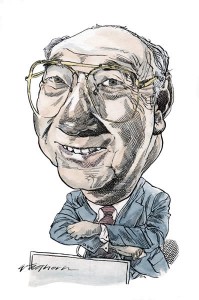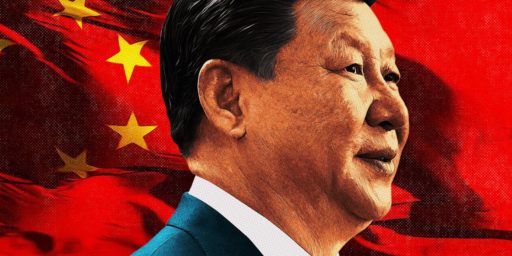Phil Gramm Destroyed Our Economy
 I’ve always liked Phil Gramm. He’s a charming, self-effacing fellow and his unfortunately named “Dicky Flatt Test” always struck me as the right approach to federal spending. I was, therefore, chagrined to learn, via Steve Benen, that Gramm almost singlehandedly destroyed our economic system.
I’ve always liked Phil Gramm. He’s a charming, self-effacing fellow and his unfortunately named “Dicky Flatt Test” always struck me as the right approach to federal spending. I was, therefore, chagrined to learn, via Steve Benen, that Gramm almost singlehandedly destroyed our economic system.
Time magazine, highlighting some of those most responsible for the economic crisis, recently singled out former Sen. Phil Gramm (R-Texas), and for good reason. Few deserve as much blame as the former chairman of the Senate Banking Committee.
Gramm “played a leading role in writing and pushing through Congress the 1999 repeal of the Depression-era Glass-Steagall Act, which separated commercial banks from Wall Street,” Time explained. “He also inserted a key provision into the 2000 Commodity Futures Modernization Act that exempted over-the-counter derivatives like credit-default swaps from regulation by the Commodity Futures Trading Commission. Credit-default swaps took down AIG, which has cost the U.S. $150 billion thus far.”
What’s particularly interesting is that Bill Clinton signed both of the bills in question, which enjoyed strong bipartisan support. They were sold on the basis of modernization and competitiveness, in that the massive European banks had much more leeway than our own and that the distinction between various financial assets had become virtually arbitrary over time.
It’s also not clear how, for example, the banking system of Iceland was ruined by Gramm’s dastardly deregulation.
Image: Kerry Waghorn Caricatures Gallery






They were sold on the basis of modernization and competitiveness,
Which was sold in via the underlying GOP philosophy on economics that a free (total) market model had the innate ability to self regulate and even function as a reliable governing force. And there were too many dems who bought into this nonsense peddled by Graham, Greenspan, and others. Yes, some dems went along, but the Grahams in congress pushed it from majority positions basically since the Reagan era/ Doubtful dems would have initiated it, if left to their own devices.
What we have here is liberals hunting for something/anything… or more correctly, someone/anyone to pin this economic failure on, other than themselves.
Benen fails to recognize… no shock, here… that economies seldom if ever in history have tanked on their own; that invariably, the cause has been governmental tampering. Such is the situation here. Forget about trying to get him to admit it, however.
I’m with bithead. The CRA alone didn’t cause the meltdown. Read “When Genius Failed,” the story of Long Term Capital Management. From the 80’s through the end of the century when futures trading went predominantly electronic, government was giving too many wrong signals to Wall Street, Main Street and the rest of the world. Politicians aren’t smart; they had no idea how their meddling would give the wrong signals. They never have. Doesn’t matter what party. Guys like Benen, Yglesias, Marshall are intelligent people, but they haven’t been around long enough to see through the fog in which they exist.
Perhaps they will learn something of real value now that their ideas and ideology have been implemented. Let’s hope they will be honest in their appraisal.
Ah, yes. It was electronics and wrong signals that made em do it. No doubt malfunctioning tin foil hats and the Devil were also involved. That beastly Clinton, I reckon. Him and all that liberal fog.
Wow. That is quite a feat – singlehandedly destroying the financial system. I didn’t know that a lowly Senator had such enormous power. It is also an over-the-top exageration. There were many contributors, enablers, and cheerleaders of the enormous debt-fueled financial bubble. A few are Bill Clinton, Alan Greenspan, Barney Frank, Phil Gramm, GW Bush, and Cox (SEC). Ultimately, what was behind the bubble that got us into this Depression mess is the search for “higher yield”. It is the underlying driving force behind subprime mortgage securitization, behind Madoff, behind the explosion in derivatives, behind the Iceland debacle, behind the housing bubble itself. When interest rates are very low, people (and institutions) scramble for yield, and will jump into any risky investment that pays more than a bank account. And this is especially true if recent history had higher yields on relatively safe investments. Since the 1981-2008 period was a time of disinflation, with more or less steadily declining safe yields, investors kept taking greater and greater risks until the system blew up. Sure there were a large number of cheerleaders and enablers, but so what. That is always the case when there is a big party.
Freedom just causes so damn many problems. Can’t wait for President Obama to fix it.
What the Gramm/Clinton legislation allow was it allowed Paulson and Bush and Bernanke to destroy the economy forcing real banks to absorb insolvent “investment” banks (i.e. legal gambling houses).
Just stop it!
Trying to attribute this problem to one party, one belief, one character, and at one point in time, is like trying to figure from which monkey your genes came from.
You can’t do it.
Both parties are corrupt.
Both political beliefs would sell out for votes.
All players are far from perfect, some more than others.
And this has been going on forever, and it will continue.
And I like monkeys..
Thank yew, Thank yew, Thank yew vurry much..
It’s not about parties, but about economic philosophy. The economic philosophy that champions freedom, as in total freedom to do whatever. A profoundly un-conservative notion, yet promoted by conservatives for economic theory the past thirty years, until it became the primary mode of doing business. And in the end, Nietzsche turned out to be right — Total freedom is the ultimate prison.
Stuck, try reading the book first. I was at the Chicago Mercantile Exchange from 1984 til 1995. I know what the attitude was of guys on Wall Street. What is your experience that permits you to be such an expert on this matter?
Didn’t say I was an expert and don’t need permission for stating my impressions of what the problem is. And I wouldn’t brag too much about being a trader and likely part of the problem. And my viewpoint is hardly unique, it was derived from reading a lot of opinion from a lot of different people who are smarter than I on the subject, I admit. If you think I’m wrong just say so, and make an argument rather than assuming an air of superior knowledge.
You are right.
Conservative economic philosophy, which we have in the past associated with the Republican Party is now a belief that a few Republicans and even fewer democrats possess.
Now, socialism, and all the tenants ascribed to that belief seems to be prevalent, even in the republicans.
Believing in government can do us a greater good, begets more bad government and more disappointments, and more cries from the uninformed for more bad government…etc…etc..
It’s the black hole of economic reasoning…
Nice try. My comment was specific to the prevailing and current conservative philosophy of de-regulation and market self governance, not on Bush spending etc….
bitsy all you are is the flip side of that coin. What exactly are you whining about?
Regulatory capture – I think making it about party or politics hides the broader problem.
Stuck, I’m not arguing the lack of oversight nor the fact that greed contributed. I’m just trying to alert you to the fact that government intervention in the free market can change attitudes for the worse. And they intervened with the CRA, with Freddie Mac, Fannie Mae, etc. The bail out of the NY banks in the LTCM debacle, with the endorsement of the NY Fed, basically implied that if you are too big to fail, who cares about extra risk? So, the attitude of lenders became arrogant. As far as govt. officials are concerned, their only concern is the next election cycle and that was made very obvious by the lack of oversight and all the favors received.
Pete
I don’t think anyone wants to see government get any more involved in private business, any more than is necessary to prevent what is happening now. The Glass/Staegal act had worked well since the GD in maintaining excesses in greed. I doubt Graham is solely to blame for destroying the economy. That is Hyperbole IMO. But the fact remains, that many believe repealing that law, and other checks, lit the fuse that led us to our current severe problems, beyond normal downturns or normal bubbles that break. In other words, there is a balance to be maintained between gov regulation and excessive gov interference in the market place, and the pendulum swung to far to deregulation imo, and now has to be re-calibrated. And Fanny Mae existing didn’t cause the problem, it was their management that took advantage of Grahams 2000 bill and jumped into the derivatives gambling game, dubious subprime loans, and credit/default swaps stuff. Hopefully, Obama will get it right.
As you may suspect, I am not a fan of government having much to do with policy initiatives in the free market. I accept the necessity of govt as a watch dog, but when the watch dog is fed a dog bone to look the other way, chaos ensues.
I agree that this whole thing spiraled out of control. But why do so many people believe govt. will do a better job of managing the economy? There is no incentive to do so. Govt screws up; they raise taxes.
Your first statement; I don’t believe. People have ceded their personal responsibility to govt. It’s easier. You are former military-I am former military. What did we learn? It is not what is driving the attitudes of this country.
OK, as one who has given up on figuring out this whole canard (short of getting a degree in economics, I will never figure out up from down because for every economist who says “A” I find another who says “B”) I have to say that,
(pete, I am not picking on you)
the CRA apparently had very little to do with the present mess. From this:
Only six percent of the subprime loans made by CRA-covered lenders went “to lower-income borrowers or neighborhoods.†It was non-bank mortgage companies — not covered by CRA — that originated 50 percent of subprime loans.
In other words, it was the promise of easy money that got us into this mess, and as my dear old daddy always said, “If it sounds too good to be true… It probably is.”
Follow the link, and all the links therein, don’t self censure, read them. I don’t know, but I am waiting for actual facts that actually contradict… not talking points based on mere idealogy.
Exactly. The promise. You suggested i not brag about my time at the Chicago Mercantile Exchange. That was not my intent. I was the primary broker for Salomon Brothers in those days. As a result, I met those traders. The Salomon boss at the MERC chose me because I was apolitical and trustworthy. I could have have made a load of money if I had adopted their attitude. But I was raised by parents who believed in “The Golden Rule.” So i did my job based on that rule. Believe me, I know how Hillary Clinton turned $1000 into $100,000.
There was a Salomon trader named Paul Moser who brought down the firm by his arrogance. He accused me of stealing through my brokerage activities over a lunch I had with him. I almost went over the table at him. I didn’t cheat; but there was plenty of it at the MERC. This may sound like some BS story. So be it. I could give you the name of the Salomon employee who trusted me with the floor brokerage for verification, but I’m not interested in that. I am trying to establish the fact that the arrogance which existed on Wall Street, aided and abetted by the Fed, by politicians in DC who stood to benefit, and any other sleazy people involved, contributed to this meltdown.
The problem is much larger than you suggest; neither left nor right. The problem is greedy capitalists, unchecked by greedy politicians, with the rest of us having to pay to let them off the hook.
The CRA is just another symptom of arrogant politicians establishing faulty policy, based on trying to satisfy a voting bloc. Well intentioned in the press release, but neither means tested nor monitored.
Why do we trust these people to make things better?
Because we have no other choice. The alternative is dog eat dog and every man for himself. The last 10 years have been about as close to that state that I have seen. We pick our leaders and hope they won’t let us down and try and hold their feet to the fire for that purpose. Obama is no saint, and certainly no “Messiah” as some suggest/ But I do believe he is a good man and very smart, is doing what he said during the campaign. and will hopefully do the right thing for the country as a whole, in spite of the many pressures to stray into rank ideology. What conservatives have a difficulty doing imo, is stepping back and looking at their ideology on economics for being locked only into excessive promotion on the supply side of the model. That ties into the anti-reg movement we’ve been operating under for so long, and now maybe it’s time to bolster the demand side to equal things out some. That is what Obama is trying to do imo, in an almost desperate economic state he inherited. I don’t agree with everything he’s doing, and nobody has a crystal ball, but I do think it will take bold action and we are certainly seeing that.
And I believe you were an honest trader, sorry for the snark on that.
Some folks on this thread seem to have fallen for the urban legend that bush actually de-regulated the economy. That belief, is dead, flat, full stop wrong.
Obama’s assertions to the contrary, the 43rd president was the biggest regulator since Nixon.
Editorial by Phil Gramm on the Gramm-Leach-Bliley (GLB) Act of 1999
Deregulation and the Financial Panic
Loose money and politicized mortgages are the real villains.
Mr. Joyner, I am pleased that you were chagrinned to hear that Sen. Phil Gramm had a role to play.
I am not clear why it was particularly interesting to learn that Bill Clinton signed this bill (while he was in office)with bipartisan support. I think there were many bills that fit that criteria. Why did you find this one interesting?
I am at a loss to understand your logic in comparing the results in Iceland with Phil Gramm in the US. If it was humor, it was poorly done. If it was meant to support the idea that because Iceland had a problem and Phil Gramm was not responsible, ergo Phil Gramm could not have played a role in the US financial meltdown,well sir, you have strained all the rules of logic. (I am hoping it was poor humor.)
Board’sn’s0 Commodity Futures Modernization Act that exempted over-the-counter derivatives like credit-default swaps (CDS) from regulation by the Commodity Futures Trading Commission was a major cause for behind the current financial crisis. The unregulated CDSs are estimated to be between $62 trillion to over $100 trillion.
Gramm tries to place all blame on Democrats. There were several individuals to blame, such as Greenspan, Larry Summers, Robert Rubin, but it was Gramm that rammed the Commodity Futures Modernization Act (CFMA) of 2000 through Congress.
He put the approximate 300 page bill in a much pass appropriations bill (11,000 pages) just a few hours before a lame duck Christmas break. Most Democrats voted against the CFMA the first time through.
The CFMA was written by Wall Street attorneys. Bush appointed one of the primary authors, Walter Lukken, as a Commissioner at CFTC in 2002. Last summer, Maria Cantwell, (D-Wa) blocked Lukken’s appointment as Chairman of the CFTC, which was in reaction to his no interest in finding that speculator’s were manipulating oil prices.
There are strong ties between Mr. & Mrs Gramm, the Bush family, and Enron that used credit default swaps. They got energy laws changed in Texas in the early 1990s. The final thing Enron needed for their California fraud was the CFMA.
Gramm’s wife, Wendy, was Chairman of the CFTC. Just one week after Clinton’s election in November 1992 Mrs. Gramm took advantage of two vacant Commissioner positions to implement rule changes to benefit Enron. A few weeks later, Enron appointed her to its Board of Directors, where she served on the Board’s Audit Committee which made her responsible for verifying Enron’s accounting procedures and other detailed financial information not available to outside analysts or shareholders. Enron paid her between $915,000 and $1.85 million in salary, attendance fees, stock option sales and dividends from 1993 to 2000. The value of her Enron stock options grew from about $15,000 in 1995 to as much as $500,000 by 2000.â€
Enron spent $3.45 million in lobbying expenses in 1999 and 2000 to deregulate the trading of energy futures, among other issues. But other corporate giants such as Mobil, Exxon, BP, J.P. Morgan, Morgan Stanley, Goldman Sachs, Citibank, and Chase Manhattan, followed Enron’s lead in lobbying for deregulation. Gramm received the second largest amount of Enron’s lobbying money. Texas’ other Republican senator, Kay Bailey Hutchison, was the top recipient of Enron money
Several years ago, Warren Buffet called credit default swaps, “financial weapons of mass destruction.”
See a very detailed December 2001 article from Public Citizen about Enron.
Blind Faith: How Deregulation and Enron’s Influence Over Government Looted Billions from Americans
Sen. Gramm, White House Must Be Investigated for Role in Enron’s Fraud of Consumers and Shareholders
Experts have been testifying before Congress since 2001 about regulating credit default swaps, but other “experts” were telling Congress regulation would destroy the markets. Congress did nothing.
Speculators from the investment banks that we are bailing out also used credit default swaps to manipulate oil prices.
The below article is about Obama’s nomination of Gary Gensler. Seems Obama is getting bad advice on nominations. Larry Summers is probably the source for nominating Gary Gensler.
The Reeducation of Larry Summers
He’s become a champion of massive government intervention in the economy, and he’s even learning how to play nice.
“Brooksley Born, chairwoman of the Commodity Futures Trading Commission, received a call in March 1998 in her office in downtown Washington. On the other end was Deputy Treasury Secretary Summers. According to witnesses at the CFTC, Summers proceeded to dress her down, loudly and rudely. “She was ashen,” recalls Born’s deputy Michael Greenberger, who walked in as the call was ending. “She said, ‘That was Larry Summers. He was shouting at me’.” A few weeks before, Born had put out a proposal suggesting that U.S. authorities begin exploring how to regulate the vast global market in derivatives. Summers’s phone call was the first sign that her humble plan had riled America’s reigning economic elite.”
Gramm and other players in the current crisis is complicated. I have read extensive information about the history. It is far too complicated to understand from a few comments or a short article.
At least Alan Greenspan admitted he was wrong.
“It’s also not clear how, for example, the banking system of Iceland was ruined by Gramm’s dastardly deregulation.”
……Actually it is Jim but it would take a long time to explain and I don’t really feel like expending about 1000 words on the subject when there’s plenty of commentary out there as you well know. The Economist did a particularly good analysis about three months ago as I recall. De-regulation and/or lax implementation of existing regs is one of the four horseman of this whole mess. The others are: Greenspan’s easy money policies at the Fed; deficit spending on a huge scale which both weakened the dollar and contributed to overheating the economy; and a host of greedy but clever people in the financial industry who invented all kinds of ultimately destructive financial instruments and strategems. Obviously the latter is closely linked to a light regulatory regime. When you cut all the partisan bs, demonizing of individuals, some of whom deserve it, and mythmaking away from what’s happened, it’s all traceable to these four basic causes.
tom p –
The argument on CRA is that it let the genie out of the bottle, not that the volume of CRA loans caused the problem. It made extension of bad credit acceptable; and the Fannie/Freddie nexus showed loan originators the art of getting bad loans off their balance sheets. After that, like two twenty year olds in a dorm room, nature took its course.
Credit bubbles always start with the extension of bad credit. To not acknowledge CRA’s role is to deny that a 10 foot diameter snowball careening down a mountain didn’t start as as a six inch snowball.
I was pecking at the iPhone earlier, and couldn’t throw a link for Regulatory capture.
It was good of James to link this one in, but I agree that the references to Clinton and Iceland are a little to cute … not to mention distracting from what is OUR problem.
Its surprising to understand that a single person can do the damage. It shows that how an economy can take the beat, because of a mistake by a single person.
The links listed are not short reads but cover the major issues that lead to the point we are at today. For those on the right alot of blame goes to the Dem’s, for those on the left the Repub’s get their due. For those that realize the problem is the aforementioned partys you might like reading this.
http://online.wsj.com/article/SB122212948811465427.html
http://www.bergenjerseyforeclosures.com/blog/info/entry/repeal_of_glass_steagall_act
http://www.pbs.org/wgbh/pages/frontline/shows/wallstreet/weill/demise.html